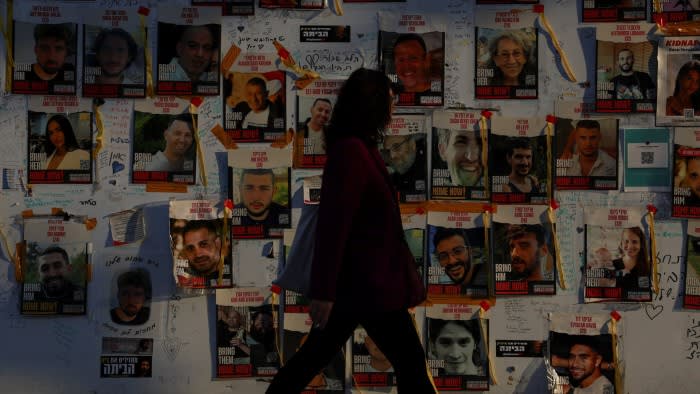Unlock the Editor’s Digest for free
Roula Khalaf, Editor of the FT, selects her favourite stories in this weekly newsletter.
Hamas said on Tuesday that the latest Israeli proposal in hostage deal talks did not meet any of its demands, after senior Israeli officials said progress had been made in the long-running negotiations.
The proposal was put to Hamas at the weekend during the latest round of talks mediated by Egypt, Qatar and the US on a deal that would free the remaining hostages held by Hamas in Gaza in exchange for a truce and the release of hundreds of Palestinian prisoners from Israeli jails.
“The [Israeli] position remains stubborn and has not responded to any of the demands of our people and our resistance,” said Hamas in a statement issued early on Tuesday.
“Despite this, the movement’s leadership is studying the submitted proposal with all national responsibility and will inform the mediators of its response once this is completed.”
People familiar with the situation said that while there had been some progress in the latest discussions, key sticking points remained, with Israel rejecting Hamas’s demands that any deal ultimately lead to a permanent ceasefire, and that civilians be allowed to return freely to the north of Gaza.
An Israeli official said Israel was not prepared to allow anyone connected with Hamas to return to the north of the enclave.
Israel had previously offered to allow 60,000 Gazans to return to the north, but the official said Israel was prepared to be “more flexible if it saw some flexibility from the other side”. Anyone returning would have to undergo security screening, the official added.
Hamas’s statement followed optimistic comments by Israeli officials, with both foreign minister Israel Katz and defence minister Yoav Gallant saying that progress had been made in the latest talks in Cairo.
Katz said on Monday that “if matters work out, a large number of hostages will return home and, in stages, everyone”. He also said he was “more optimistic than I was, but we can’t promise things when dealing with Hamas”.
Gallant said Israel had a chance to bring back the hostages, but that doing so would require “difficult decisions”.
Hamas seized about 250 hostages during the October 7 attack that triggered the Gaza war. About 110 of them were released under a Qatar-brokered deal in exchange for about 240 Palestinian prisoners during a brief truce last year.
Since then, mediators have been attempting to negotiate a new deal that would secure the release of the remaining 133 hostages — including some who Israel believes are dead — still held in Gaza.
The latest talks have revolved around a multiphase deal, the first part of which would involve the release of about 40 hostages in exchange for hundreds of Palestinian prisoners as well as a six-week ceasefire.
Israel’s war cabinet and security cabinet were expected to discuss the hostage negotiations in meetings on Tuesday.
Israeli Prime Minister Benjamin Netanyahu said on Monday that he had been briefed on the talks in Cairo and that Israel was working to bring the hostages home.
But he also insisted that Israel would carry out an assault on Rafah, the southern Gazan city where more than 1mn people who have fled fighting elsewhere in the strip are sheltering. Netanyahu said a date had been set for the operation but he did not elaborate further.

Emily Foster is a globe-trotting journalist based in the UK. Her articles offer readers a global perspective on international events, exploring complex geopolitical issues and providing a nuanced view of the world’s most pressing challenges.








